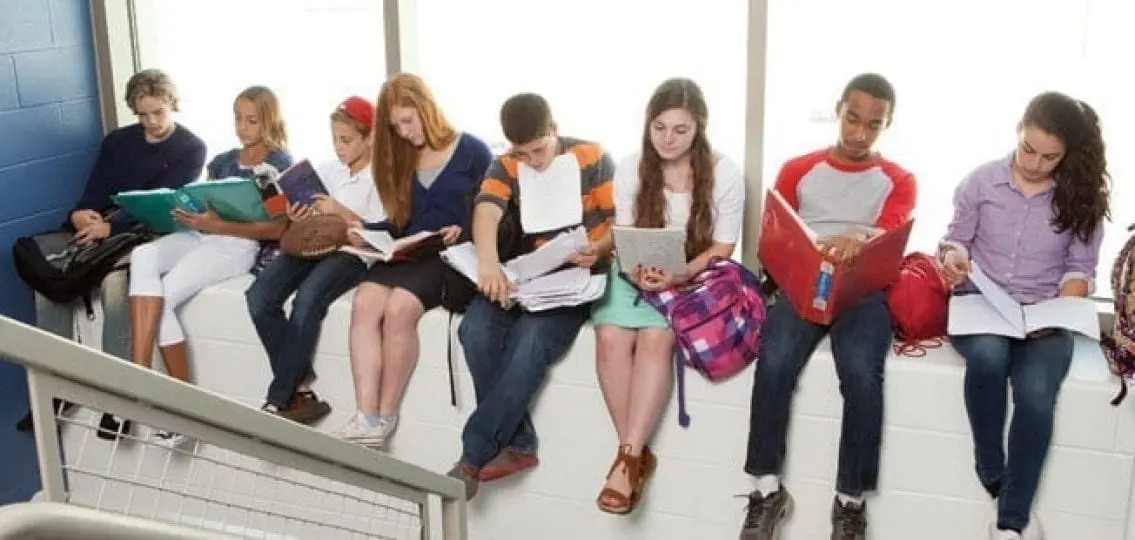So, parents of rising 9th graders … are you ready to have a child in high school? To help ease your middle school to high school transition, we asked three leading experts for their top advice for parents. Dr. Michael Bradley, author of When Things Get Crazy With Your Teen: The Why, The How and What to Do Now! and Crazy-stressed: Saving Today’s Overwhelmed Teens with Love, Laughter, and the Science of Resilience. Mandi Silverman, psychologist with Child Mind Institute, and Barbara Greenberg, Ph.D., co-author of Teenage as a Second Language share transition to high school tips you won’t want to miss.

Planning to be a Parent of a High School Student:
1. Think now about limits.
“Parents should set up and discuss some very strong fences (non-negotiable rules) about the ‘code red’ things that can seriously hurt their teenagers, like drugs and alcohol,” says Dr. Michael Bradley, a psychologist and author of When Things Get Crazy With Your Teen: The Why, The How and What to Do Now!.
Talk to teenagers about your specific expectations and what the consequences will be for ignoring them. If we catch you drinking alcohol, then X, Y, or Z … Meanwhile, for “code orange” things — a clean room, decent grades, 9 hours of sleep — remind your teenager that with responsibility comes privilege (for example, decent grades means we’re more likely to let you go to a concert on a school night), adds Bradley.
Lastly, with the transition from middle school to high school, parents should be willing to hand off control for “code yellow” stuff, which Bradley says includes clothes, non-offensive teen slang, hair styles, music … “Your teenager is just trying to figure out who he truly is.”
2. Accept that there will be conflict.
You will not get through high school without some conflict with your teenager. Welcome it, says Bradley. “Moderate conflict is a sign that you’ve done your job well. Adolescence is the rebirthing of your child where once again she distances a bit as part of nature’s plan for her to become an autonomous adult. Just like with labor, this miracle also involves some pain. IT’S OKAY! She’s supposed to ‘hate’ you at times. Weirdly enough, you’re ‘ruining’ her life feels like love to her.”
3. Remember that humor helps.
Beyond all else, keep laughing, adds Bradley. “Humor is the last stand sanity-preserving strategy for soldiers, cops and parents of teenagers. In dark teen times, my wife and I often reference a cartoon we love showing an exhausted couple on a couch. The dad turns to mom and says, ‘Well, dear, now that the kids are all in jail, maybe we can finally take that trip we always planned.'”
4. Focus on the positive.
When it comes to the transition from middle school to high school, your teenager is probably feeling a combination of excitement and worry. “It’s important to focus on the positive elements of the transition,” says Dr. Mandi Silverman, a psychologist with New York City’s Child Mind Institute. “Research tells us that a positive appraisal of an event typically leads to better outcomes.”
“Positively encouraging your teenager and helping her get excited about the transition is helpful,” adds Silverman. “This could be, ‘I’m so excited to see what your favorite parts of your high school experience are.’ It could also be, ‘I look forward to seeing you continue to do the activities you enjoy in high school and getting even better at them.'”
5. Embrace the big changes that come with high school.
Over the next four years, your adolescent will grow up a lot — and not just physically. You have a young adult in the making. “Another thing parents can do is think about changes that happen when kids to go high school,” says Silverman. “This includes physical changes — in vocal tone, appearance, attitude — increased interest in romantic relationships, increased time with friends, and an increase in homework and academic pressure.”
6. Have a united front.
It’s helpful for parents to be on the same page for the big stuff, so they can present a united front, recommends Silverman. Before you begin the transition from middle school to high school, have a talk with about expectations. This way both sides can negotiate and come to an agreement about those expectations. Adds Silverman: Otherwise, parents end up discussing them in the heat of the moment — We didn’t expect you to come home at 1 a.m.! — which can increase conflict and also make teenagers feel that things are unfair (You didn’t tell me when to be home!).
7. Be chill … at least after school.
Your kids will need more decompression time, stresses Barbara Greenberg, Ph.D., co-author of Teenage as a Second Language. “Their plates are fuller. They will have more school work. They’re busy trying to identify their peer tribe. And they’re beginning the journey of figuring out who they are. It’s no wonder that teenagers come home from school exhausted and not ready to talk. Honor this.”

Greenberg recommends parents allow 9th graders to have some alone time after school. “Don’t pepper them with questions. Don’t be offended when they don’t want to sit down with you and chat about their day after school. Instead, greet them and let them know that you are around if they want to talk later.” Your teenager will not only appreciate this, but also will feel that you are attuned and understand her needs — a big positive for the parent-teen relationship. “After all, don’t we all need a little alone time to wind down after a long and hard day? No one can be expected to be ‘on’ constantly,” says Greenberg. “Especially a busy, hormonal teen who is navigating a major set of transitions.”
Learn more about our experts at these websites: DrBarbaraGreenberg.com, DocMikeBradley.com, and the Child Mind Institute.




